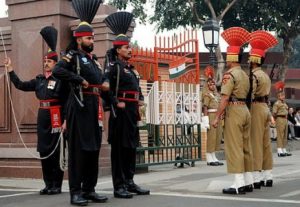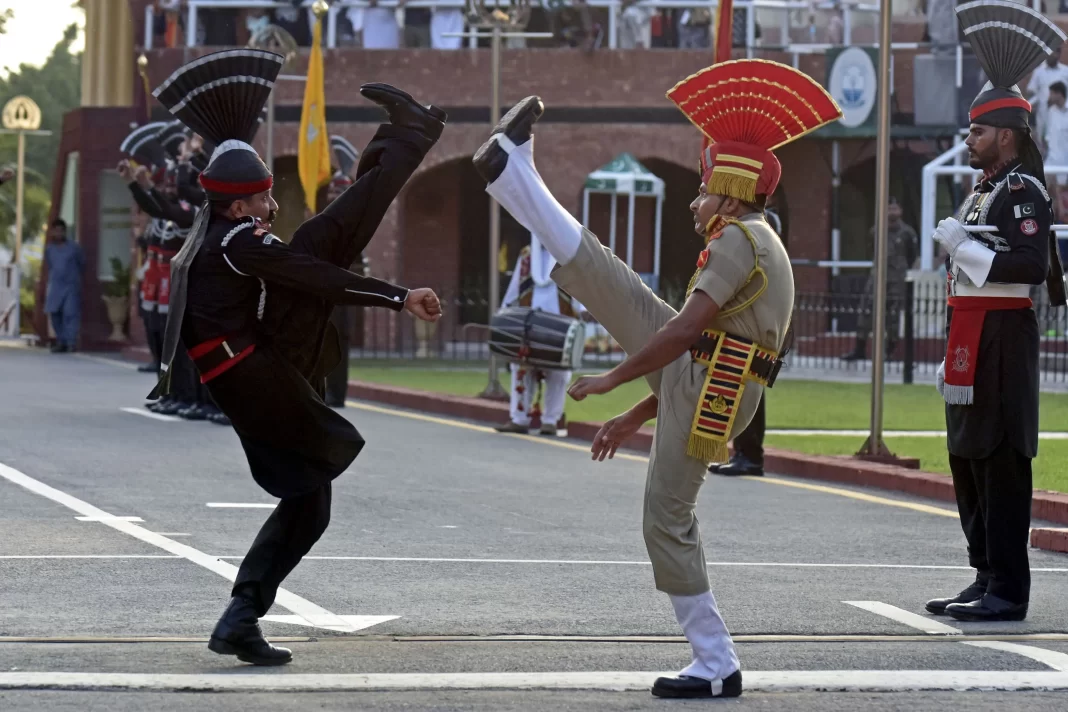LAHORE: With fearless poise, fierce glares, and those iconic moustache twirls, the soldiers of the Pakistan Rangers bring a unique flair to the daily flag-raising and lowering ceremonies at the joint border posts.
Border tensions between Pakistan and India have added intensity to these events, where the atmosphere is now charged with national pride and thunderous chants echoing across the Wagah and Ganda Singh Wala borders. These parades are more than just tradition; they send a strong message: Pakistan stands united, alert, and ready to defend against any threats.
On Sunday, thousands of Pakistanis put aside the ongoing regional tensions and gathered at both borders to see the Pakistan Rangers Punjab in action. At Wagah, the energy was palpable. Chants of “Allah-o-Akbar” and “Pakistan Zindabad” filled the air as families, including mothers with their little ones, came out in droves. The border transformed into a lively display of national unity and patriotic spirit.

The Pakistan Rangers Punjab truly stole the spotlight with their impressive performance. Their powerful stomps and synchronized movements ignited a sense of national pride and seemed to resonate with the Indian troops stationed on the other side.
A similar enthusiasm was palpable at the Ganda Singh Wala border in the Kasur district. While the turnout was smaller compared to Wagah, the excitement was just as vibrant. Spectators were treated to a captivating display of military discipline and a symbolic exchange of gestures between the Pakistan Rangers and the Indian Border Security Force (BSF) personnel.
Due to rising tensions, the zero-line barrier at Ganda Singh Wala remains in place, and the usual ceremonial flag-lowering lacked the typical cross-border interaction. Still, citizens showed their pride and national spirit during the event.
“These moments fill our hearts with joy,” shared one attendee. “Every Pakistani is ready to stand up, not just with words but with action, if the enemy dares to challenge us.” Meanwhile, a resident from Lahore showered rose petals on the Rangers, while the Indian side of Ganda Singh Wala saw mostly empty stands.
Each evening, just before sunset, the daily flag-lowering ceremony between the Pakistan Rangers Punjab and India’s BSF at Wagah transforms into a powerful display of national pride, discipline, and unity.
This ceremony has been held without interruption since August 14, 1959, evolving from a mere military ritual into a vibrant expression of patriotism and public solidarity. People from all over the country gather at the border, turning the event into a national spectacle.
“When the national flag is lowered, my heart races with emotion,” said an elderly man. “Every Pakistani here feels like a soldier.” A woman attending the ceremony noted, “When you come here, you realize we are not just Sindhi, Baloch, Punjabi, or Pashtun. We are Pakistanis first—and that is our true identity.”
A visitor from Karachi added, “We are not afraid of threats. If war is forced upon us, we will prepare even our children to defend our motherland. This land is the result of our forefathers’ sacrifices—we will not let it be harmed.”
On April 24, India limited public participation in the ceremony on its side and kept the gates closed. In contrast, Pakistan has continued to uphold the tradition with full enthusiasm, sending a clear message to the world: the spirit of this nation cannot be broken.
For the latest updates and insights on new developments, visit the NEWSON
Q1. What is the daily flag-lowering ceremony at Wagah?
The daily flag-lowering ceremony at Wagah is a military ritual performed by the Pakistan Rangers and India’s Border Security Force (BSF), symbolizing national pride and discipline.
Q2. Why is the Wagah flag ceremony important to Pakistanis?
The Wagah ceremony has become a national symbol of unity, showcasing the country’s military strength, patriotic spirit, and cultural identity.
Q3. How do rising India-Pakistan tensions affect the ceremony?
While diplomatic tensions remain high, the ceremony continues with full enthusiasm on the Pakistani side, serving as a public statement of resilience and readiness.
Q4. What makes the Wagah event unique?
Known for its fierce glares, synchronized stomps, and passionate chants, the Wagah event blends military precision with dramatic flair, unlike any other military ritual.
Q5. Where else is this ceremony held besides Wagah?
A similar flag-lowering ceremony also takes place at Ganda Singh Wala in the Kasur district, though with a smaller crowd but equal patriotic spirit.
Q6. What is the significance of public participation in these events?
Public attendance reinforces national unity. Families, elders, and youth alike gather to express support for the military and love for their country.


